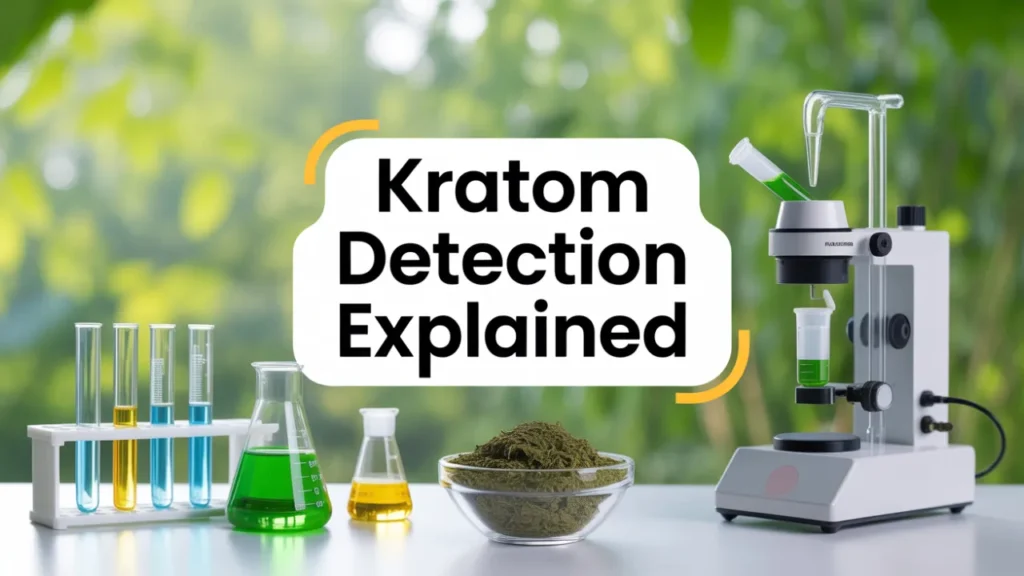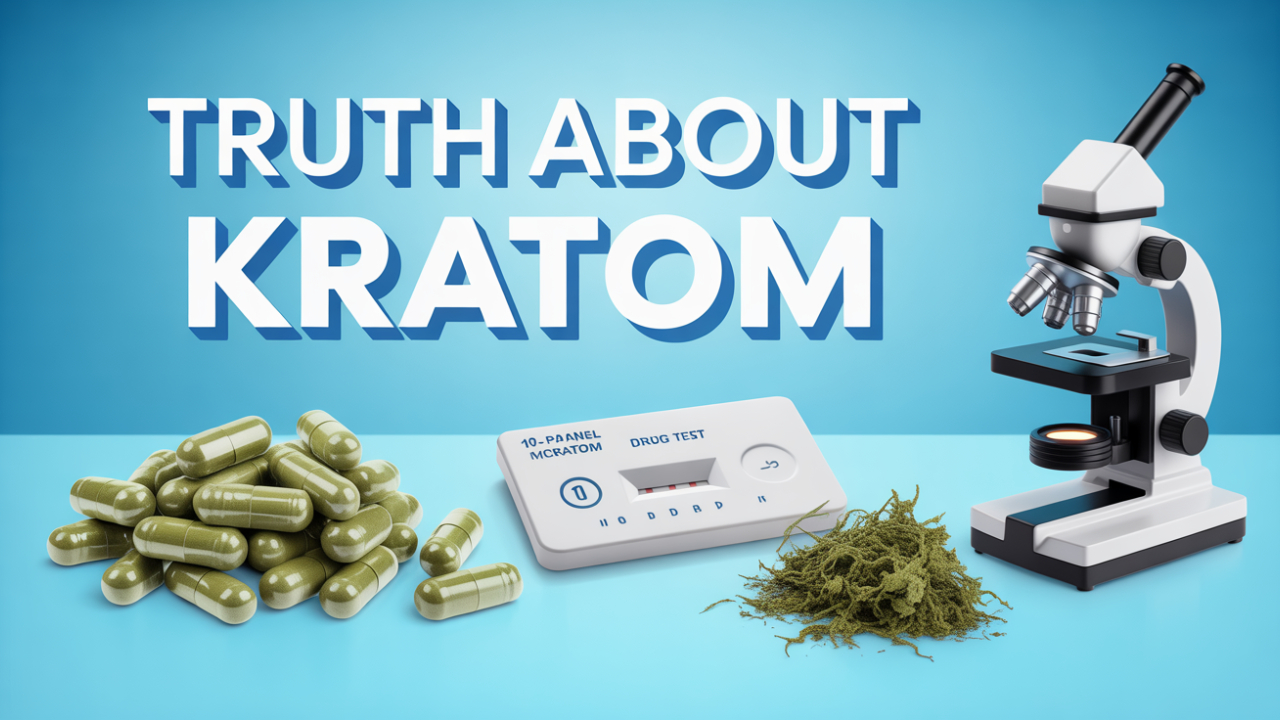Does Kratom Show Up On A 10 Panel Test?
At Lynk Diagnostics, many patients and providers ask the same question: Does kratom show up on a 10 panel test? This blog gives a direct, evidence-based answer. It also explains how kratom works in the body, how long its active ingredients stay detectable, and what drug testing methods might reveal it.
As a diagnostics lab specializing in urine drug test cups and lab confirmations, Lynk Diagnostics delivers fast, reliable test results for clinics, treatment centers, and health care professionals. If kratom screening is a concern, we offer the technology and testing expertise to support accurate detection.
What Is Kratom (Mitragyna Speciosa)?
Kratom, or Mitragyna speciosa, is a tropical plant from Southeast Asia.
The plant’s alkaloid content, especially mitragynine, produces stimulant effects at low doses and opioid-like sedation at higher doses. Kratom is typically consumed as a tea, capsule, or powder. Though derived from a plant in the rubiaceae family, kratom is not harmless.
It has side effects like vomiting, constipation, diarrhea, euphoria, and sedation, and it may lead to relapse in people recovering from substance use disorder.
What’s In A 10 Panel Drug Test?
A standard 10 panel urine test detects the following controlled substances:
- Amphetamine (e.g., Adderall)
- Methamphetamine
- Cocaine
- Cannabinoid (THC)
- Opiate (e.g., codeine, morphine, heroin)
- Benzodiazepine (e.g., alprazolam, diazepam)
- Barbiturate
- Phencyclidine (PCP)
- Methadone
- Propoxyphene or Oxycodone, depending on the panel version
Kratom is not included in standard 10 panel drug screens. It is not an FDA-approved medication and does not fall under the Controlled Substances Act, although the Drug Enforcement Administration (DEA) has considered its regulation.
Does Kratom Show Up On A 10 Panel Test?
No, kratom does not show up on a standard 10 panel drug test.
This is because mitragynine, kratom’s active ingredient, and its metabolite 7-hydroxymitragynine are not part of routine panel screens. The Food and Drug Administration (FDA) does not recognize kratom as a medical treatment, which limits standardized testing inclusion.
However, some labs, including Lynk Diagnostics, can test for kratom upon request using mass spectrometry or chromatography techniques in urinalysis, blood tests, saliva testing, or hair follicle tests.
How Is Kratom Detected in the Body?
Kratom’s alkaloids are metabolized in the liver and processed through urine. Detection depends on dose, frequency, body fat percentage, diet, and individual health.

Urine Test
Most common method for kratom detection. Mitragynine can appear in urine within hours and remain detectable for up to 7 days.
Blood Test
Detects recent use (within 1–2 days) and shows current levels. Blood is used when immediate impairment is a concern.
Saliva Testing
Less common for kratom but may be used in certain clinics. Can detect active use but has a short detection window.
Hair Follicle Test
Detects chronic or long-term use. Mitragynine may be present in hair for 30+ days post-use.
At Lynk Diagnostics, we help clinics choose the correct testing method for each patient, ensuring accuracy whether testing for kratom, alcohol, or prescription drugs like buprenorphine, tramadol, or hydrocodone.
Can Kratom Be Mistaken For Other Substances?
Though mitragynine is unique, some immunoassays may produce false positives for opioids due to kratom’s opioid-like effects. However, these are rare and usually corrected during lab confirmation using mass spectrometry.
Lynk Diagnostics always follows up on preliminary screens with lab-grade chromatography confirmation for precise results. This eliminates misidentification and supports sobriety, especially in dual diagnosis programs where mental health and substance use intersect.
Why Would Someone Test For Kratom?
1. Monitoring Relapse Risk
In outpatient programs or PHPs (Partial Hospitalization Programs), kratom use may signal a relapse. Though legal in many areas, its opioid-like action can trigger cravings in those recovering from addiction to fentanyl, oxycodone, or morphine.
2. Evaluating Mood and Mental Health
Kratom affects the brain, influencing mood, anxiety, insomnia, and conditions like major depressive disorder or attention deficit hyperactivity disorder (ADHD). Patients may use it in place of prescribed medications like Adderall or alprazolam.
3. Verifying Treatment Compliance
For clinics providing detox, mental health treatment, or dialectical behavior therapy, screening for kratom ensures patients aren’t substituting one controlled substance for another.
Is Kratom Legal?
Kratom is legal in most U.S. states but banned or regulated in some areas, including:
- Rhode Island
- Nevada (local restrictions)
- Utah (regulated via the Kratom Consumer Protection Act)
- Certain cities or counties nationwide
It remains legal in countries like Indonesia and Malaysia, but law enforcement worldwide continues to review kratom due to rising misuse.
Always consult your state law or law enforcement guidelines for updates.

What Are the Risks of Kratom?
Despite its natural origin, kratom use comes with risks. These include:
- Constipation
- Vomiting and diarrhea
- Appetite changes
- Psychosis
- Liver toxicity
- Sedation
- Euphoria and dependency
The DEA, FDA, and ongoing research warn against kratom’s potential for abuse, especially in patients with a history of narcotic, benzodiazepine, or stimulant misuse.
Kratom, Insurance, and Drug Testing
Most insurance plans, including Aetna and other major carriers, do not require kratom-specific testing unless requested. However, some plans may reimburse kratom panels if testing is part of a broader mental health or substance use treatment.
Lynk Diagnostics offers flexible billing and verify insurance options for clinics and providers, ensuring that patients receive the tests they need without delays.
How Lynk Diagnostics Helps Detect Kratom
Lynk Diagnostics supports labs, treatment centers, and health care providers with:
- Custom kratom testing panels
- Urine drug test cups that include kratom detection on request
- Advanced chromatography and mass spectrometry tools
- Consent-driven collection protocols
- Testing support in cities like Atlanta, Utah, Nevada, and Rhode Island
We also assist with patient education, lab interpretation, and test result reporting via SMS and secure portals.
Can Kratom Interfere With Other Medications?
Yes. Kratom can interfere with opioids, methadone, tramadol, and other controlled substances. It may affect blood pressure, alter mood, and mask symptoms of anxiety or depression, confusing treatment outcomes.
It also risks liver damage when combined with other medications or alcohol. Clinicians should screen for kratom in cases of medication non-response, appetite changes, constipation, or erratic productivity.
Kratom Use in Mental Health & Dual Diagnosis Programs
In dual diagnosis patients—those with both mental illness and substance use disorders—kratom may complicate outcomes.
Patients with major depressive disorder, anxiety, ADHD, or psychosis may use kratom as self-medication, increasing the chance of dependency and relapse.
At Lynk Diagnostics, we partner with mental health programs to incorporate kratom testing into routine urinalysis, especially for outpatient clients transitioning from detox or PHP services.
How Long Does Kratom Stay in the Body?
The detection window varies by test type and usage:
- Urine: 1–7 days
- Blood: 1–2 days
- Saliva: Less than 24 hours
- Hair: Up to 90 days (chronic users)
Dose, diet, liver health, and body fat percentage all affect detection times.
Final Thoughts: Does Kratom Show Up On A 10 Panel Test?
Kratom does not show up on a standard 10 panel drug test—but that doesn’t mean it’s undetectable.
With targeted screening, kratom’s active ingredient and metabolite can be found in urine, blood, or hair samples. For clinics treating mental health, addiction, or patients with dual diagnosis, identifying kratom use helps reduce risk, improve outcomes, and maintain sobriety.
Lynk Diagnostics offers advanced kratom detection using lab-grade techniques. Our test cups, mass spectrometry tools, and nationwide support ensure your clinic stays informed and compliant.
Need kratom testing options or to verify insurance? Visit LynkDiagnostics.com today.
FAQs
Here are NLP-optimized, SEO-friendly answers to the FAQ questions shown in your screenshot:
Can a 10-panel drug test detect kratom?
No, a standard 10-panel drug test does not detect kratom. It does not screen for mitragynine, the active alkaloid in Mitragyna speciosa, or its metabolites. Specialized lab tests are needed to detect kratom.
What drugs show up on a 10-panel test?
A typical 10-panel drug test detects:
- Amphetamines (e.g., Adderall)
- Methamphetamines
- Cocaine
- Cannabinoids (THC)
- Opiates (e.g., codeine, morphine)
- Benzodiazepines (e.g., alprazolam, diazepam)
- Barbiturates
- Phencyclidine (PCP)
- Methadone
- Propoxyphene or oxycodone
Kratom is not included unless requested with a specialized panel.
What tests positive for kratom?
Kratom can test positive on specialized drug tests that target mitragynine and 7-hydroxymitragynine. These are detected using urine, blood, saliva, or hair follicle tests processed with chromatography or mass spectrometry. Kratom will not trigger a positive result on a basic 10-panel test.
Do lab tests test for kratom?
Yes, some labs—like Lynk Diagnostics—offer kratom detection through advanced urinalysis, blood tests, and saliva testing. These lab tests use confirmed mass spectrometry to identify kratom’s presence. They’re especially useful in outpatient programs, mental health treatment, or relapse monitoring.








